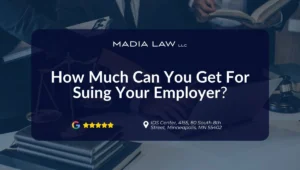
If you’ve ever asked yourself, “How much can you get for suing your employer?” you’re not alone. Workplace injustices like harassment, discrimination, wrongful termination, and retaliation can leave you feeling powerless, uncertain, and financially vulnerable. These issues don’t just affect your job; they can damage your career, emotional well-being, and financial stability.
But here’s the truth: You have rights, and you may be entitled to significant compensation. At Madia Law LLC, we focus exclusively on employment lawsuits in Minnesota, helping local employees like you to fight back, secure justice, and recover the compensation they deserve.
Your employer won’t fight for your rights, but we will.
Ready to explore how much your case might be worth? Let’s dive in.
How Workplace Injustice Affects Employees and Legal Outcomes
Workplace injustices can damage your career, finances, and emotional well-being. The consequences can be severe, ranging from lost wages to stress and reputational harm. Across Minnesota, employees facing mistreatment in the workplace often experience long-term professional and personal setbacks.
Understanding these injustices and their impact under in-state labor laws is key to building a strong legal case and securing the compensation you deserve.
Common Types of Workplace Injustice
Injustices that often lead to legal action across the state include:
-
- Discrimination: Unequal treatment based on race, gender, age, disability, or religion. Protected under state and federal laws.
- Harassment: A hostile work environment created by unwelcome behavior, offensive remarks, or sexual harassment.
- Wrongful Termination: Being fired illegally, whether due to retaliation, discrimination, or labor law violations.
- Wage Disputes: Unpaid wages, denied overtime, or withheld benefits, common in local service and retail jobs.
Impact of Workplace Injustice on Employees
Workplace mistreatment across the state can lead to:
- Stress and Burnout: Constant pressure, mistreatment, and unfair treatment can lead to anxiety, depression, and emotional exhaustion.
- Financial Losses: Lost wages, wrongful termination, and unpaid earnings can create long-term economic instability.
- Emotional and Psychological Toll: Experiencing harassment or discrimination can damage self-esteem, cause distress, and impact personal relationships.
- Career Setbacks: Losing a job unfairly can make it harder to find new opportunities and rebuild your professional reputation.
For a legal consultation, call 612-349-2729
Factors That Influence Compensation in Employment Lawsuits
There are several factors that influence the compensation you are entitled to in an employment lawsuit. Some factors that will affect the total payout you can receive under state law are:
Type of Case
Under federal and state law, the compensation you may receive depends on the type of workplace injustice you’ve experienced. Cases involving harassment or wrongful termination can lead to punitive damages, financial recovery for lost wages, and compensation for emotional distress. Discrimination cases may entitle you to damages for lost income, emotional suffering, and even job reinstatement. If you’ve been a victim of wage and hour violations, you could recover unpaid wages, overtime pay, and additional penalties against your employer. The amount you can claim depends on the severity of the violation, employer misconduct, and financial impact on your life.
Financial Losses
Financial compensation in employment cases often covers lost wages, benefits, and even future earnings if you can prove that job loss has impacted your long-term earning potential. This may include back pay, unpaid bonuses, and compensation for lost promotions or raises. In some cases, damages may also extend to health insurance, retirement contributions, and other employment benefits that were unfairly taken away. Courts in the region or State labor courts often consider these factors when determining a fair payout.
Emotional Distress and Punitive Damages
Workplace injustice can seriously affect your mental and emotional well-being. If you’ve experienced anxiety, depression, or extreme stress due to mistreatment, you may be entitled to compensation for emotional distress. Additionally, if your employer’s actions were particularly reckless or intentional, the court may award punitive damages, a financial penalty designed to punish severe misconduct and prevent future violations. These types of damages are often awarded in severe in-state cases where intent or malice can be shown.
Employer Size and Resources
The size and financial strength of your employer can significantly impact your settlement amount. Larger companies often have more resources and may offer higher payouts to avoid bad publicity and prolonged legal battles. They are also more likely to have legal teams dedicated to handling settlements. On the other hand, smaller In-state employers or Local businesses may offer lower settlements due to limited funds. Still, they might be more willing to settle quickly to avoid the high costs of litigation. Understanding your employer’s financial position can help you strategize your case and maximize your compensation.
Average Settlement Amounts by Case Type
There is no specific settlement amount for any employment lawsuit. It depends solely on the type and severity of the case. Let’s look at the common settlement amounts based on different case types seen locally.
Workplace Discrimination Settlements
According to the Equal Employment Opportunity Commission (EEOC) newsroom, the most common settlement amount for discrimination is $40,000. However, the amount can be several hundred thousand dollars for more serious claims involving long-term harm and large companies.
Wrongful Termination Compensation
The average settlement amount for wrongful termination ranges from $50,000 to $300,000. It often includes back pay, lost benefits, and future wages. The amount can be even higher if the termination is retaliation or discrimination. Locally, courts also factor in emotional distress and reputational harm, depending on the employer’s.
Workplace Harassment Settlements
Depending on the circumstances, the settlement amount for harassment cases may range from $30,000 to $250,000 or more. Compensation is particularly high for sexual harassment. Settlements generally cover compensation for emotional distress, punitive damages, and payback.
Wage Dispute Settlements
For wage dispute settlement cases, you can receive $5,000 to $100,000. This includes compensation for unpaid wages, overtime funds, and any associated legal fees. Wage theft claims frequently arise in local service, retail, and healthcare sectors across the state.
Click to contact our personal injury lawyers today
How to Sue Your Employer: Step-by-Step Process
Suing your employer without preparation can lead to unfavorable outcomes. A poorly managed claim can weaken your case, so here’s a step-by-step guide to approach the process effectively within your state.
Consult an Employment Lawyer
The first and most important step is to consult an experienced Minnesota employment lawyer who can assess your case, explain your legal rights, and help determine whether legal action is the best option. A local attorney who understands state employment law can help you navigate procedures more effectively.
Gather Evidence
You should gather every piece of information that strengthens your case. Be sure to keep track of every instance of injustice, including dates, locations, and people involved. Documents like emails, performance reviews, pay stubs, and witness testimony will also help solidify your claim. Courts in the region expect organized, factual evidence.
File a Complaint
Before you can file a lawsuit, you must submit a complaint to the appropriate agency, such as the Equal Employment Opportunity Commission (EEOC). In the state, you may also report to relevant agencies that handle employment violations. Deadlines apply, so don’t delay.
Negotiate a Settlement
Most employment disputes are resolved through settlement before going to trial. Your lawyer will work to ensure the agreement reflects the full scope of your damages. Locally, many claims settle during early negotiations.
File a Lawsuit
If you cannot reach a settlement with your employer, the next step is to file a formal lawsuit. This involves submitting your case to a court, where you’ll present your evidence, and your employer will defend themselves. If the case is complex, it may go to trial.
Complete a Case Evaluation form now
How to Prove Your Employment Lawsuit
If your case goes to court or trial, presenting the right evidence is essential. Strong documentation can significantly improve outcomes, especially for state-level employment claims. Here’s what you can do:
Documented Evidence
Gather all forms of communication that support your case, such as emails, memos, written warnings, or messages. These materials help show consistent patterns of mistreatment or policy violations recognized in cases handled locally.
Witness Testimony
Testimony from the witnesses of the injustice within or outside the organization can significantly increase your chances of the claim. So, you must talk to them beforehand to provide a reliable account of the situation.
Employment Records
Pay stubs, performance reviews, attendance logs, and benefits documentation are vital to demonstrate financial losses and job history. These records are frequently used as core evidence in employment cases across the state.
Legal Protections for Employees in the U.S.
U.S. federal and state laws protect employees from workplace injustice. If you live in a state like Minnesota, these protections may be even broader. Some key laws include:
Federal and State Laws Protecting Employee Rights
Each state has its own specific labor laws that protect employees. These laws, including the Family and Medical Leave Act (FMLA), Title VII of the Civil Rights Act, and the Americans with Disabilities Act (ADA), protect employees from workplace discrimination and wrongful termination.
Each state has its own specific labor laws that protect employees. These laws, including the Family and Medical Leave Act (FMLA), Title VII of the Civil Rights Act, and the Americans with Disabilities Act (ADA), protect employees from workplace discrimination and wrongful termination. State-level employment laws may provide additional coverage, depending on your location.
Retaliation Protections
The US government legally protects employees who file complaints or take legal action against their employer for discrimination, harassment, or other workplace injustices from retaliation. These laws enforced by the US government, ensure that employees cannot be punished for exercising their legal rights.
How to Maximize Your Settlement
Maximizing your compensation requires careful preparation, strong legal representation, and understanding how employment cases are handled locally.
Building a Strong Case
The strength of your documentation directly impacts the value of your claim. Collect emails, witness statements, and proof of lost income. In locally handled employment cases, detailed evidence often leads to better outcomes.
Choosing the Right Attorney
An experienced employment lawyer can significantly influence your case result. Choose someone familiar with state-level employment law and who understands how local court systems approach settlement negotiations.
Strategic Settlement Negotiations
Most disputes settle before trial. Your attorney will help plan the right timing and approach. In many regions, including here, strategic negotiation leads to higher payouts and faster resolution.
How Long Does an Employment Lawsuit Take?
The timeline for an employment lawsuit can vary based on case complexity and both parties’ willingness to settle. In state-level employment cases, timeframes are also affected by court scheduling and local agency investigations.
Initial Filing and Investigation
Submitting a complaint to the EEOC or a local agency can take weeks or months. Investigations through state-level employment channels may take additional time.
Settlement Negotiations
Most disputes in your region are resolved through out-of-court negotiations. These can take a few months, depending on how cooperative both parties are.
Trial Process
If a case proceeds to trial in state courts, expect it to last a year or more. Court availability and case complexity play major roles in timing.
While lawsuits can be time-consuming, your lawyer will guide you through the process and help set realistic expectations.
Costs Associated With Suing an Employer
Pursuing legal action can involve several costs, which vary depending on the case’s complexity. Understanding these expenses is crucial before proceeding.
Attorney Fees
Most employment attorneys in the Twin Cities and surrounding areas work on a contingency basis, charging 30% to 40% of your settlement. Some may ask for upfront retainers or hourly fees, depending on the case.
Additional Legal Costs
Additional charges may include court filing fees, costs for obtaining documentation (e.g., employment records), expert witness fees, and expenses for depositions or trial preparation. Your attorney should provide an estimate of the additional costs that might occur during your initial consultation.
Why Choose Madia Law for Your Employment Litigation Case
Madia Law LLC represents employees facing workplace injustices across Minnesota. Whether you’re located in the Twin Cities metro or a smaller town, our firm is committed to protecting your rights.
Proven Track Record
Our team has successfully handled numerous employment litigation cases, securing substantial settlements and verdicts for our clients.
Personalized Advocacy
We understand that every case is unique, and our client-focused approach ensures that your needs are at the forefront of our strategy.
Fearless Trial Advocacy
We fight aggressively to secure the justice and compensation you deserve. If necessary, we also take cases to trial.
Consultation with Madia Law
At Madia Law LLC, we know that pursuing legal action can feel overwhelming, especially when your livelihood is at stake. Our team is committed to providing clear, upfront information about your options and how we may be able to help.
Whether you’re facing wrongful termination, harassment, discrimination, or wage issues, we’re here to evaluate your case and guide you through the next steps.
Ready to talk? Contact us today to schedule a consultation and find out how we can help you pursue justice and fair compensation.
FAQs
What Do Employers Get Sued For The Most?
Employers are most often sued for discrimination, harassment, wrongful termination, and wage-related violations under both federal and state employment laws.
Can I Sue My Employer if I Signed an Arbitration Agreement?
Yes. Even if you’ve signed an arbitration agreement, there may be ways to challenge or work around it depending on the terms and local legal standards. Always consult with an attorney to explore your options.
Can I Sue My Previous Employer?
Yes, you can file a lawsuit against a former employer for past workplace injustices, as long as you’re still within the statute of limitations in your state.
What Should I Do if My Employer Offers a Settlement Before I File a Lawsuit?
If your employer offers a settlement, consult an attorney before accepting it. They can ensure the offer is fair and reflects the full extent of your losses.
What Happens if I Lose My Employment Lawsuit?
If you lose an employment lawsuit, you may not be entitled to any compensation and could be responsible for covering certain legal costs. Consult your attorney about potential risks before filing a lawsuit.
Can I Sue My Employer Without Hiring a Lawyer?
While it’s legally possible, representing yourself in an employment case, especially under Minnesota labor laws, can be risky. An experienced lawyer greatly improves your chances of success.
Seek Justice For Yourself Today – Contact Madia Law LLC
If you’ve experienced workplace injustice in the Twin Cities or elsewhere in the state, don’t wait to take action. Contact Madia Law LLC today for a consultation. Let our experienced team fight for your rights and help you secure the compensation and justice you deserve.
Call 612-349-2729 or complete a Case Evaluation form




